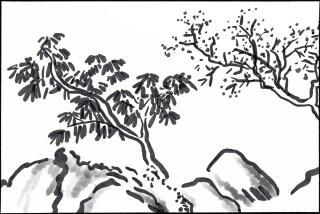Family Values: Her <i> Bubbes, </i> His Dad : NONFICTION : TESSIE AND PEARLIE: A Granddaughter’s Story,<i> By Joy Horowitz (Scribner: $21; 280 pp.)</i> : MESSAGES FROM MY FATHER,<i> By Calvin Trillin (Farrar, Straus & Giroux: $18; 128 pp.)</i>
- Share via
My favorite lines in “Tessie and Pearlie” come from near the end of the book. “Beyond love and family, which must inevitably die,” writes author and world-class granddaughter Joy Horowitz, “I now understand that there is only one thing that lasts: duty. It is a duty to go on, to observe our humanness in the face of suffering. And in this ordinary purpose, extraordinary things can happen.”
Though nothing particularly extraordinary happens in “Tessie and Pearlie”--in fact, very little happens at all in this profile of the author’s nonagenarian Jewish grandmothers--Horowitz’s book is itself an observation of humanness, a cherishing, an appreciation, a receptive seeing and hearing of her family matriarchs. It has no plot to unfold, no secrets to reveal, no thesis to prove.
Instead, as announced in the introduction, it is a “patchwork of interviews, recipes and kitchen-table advice” with photographs and reproductions of old documents. To create it, Horowitz spent 18 months conducting interviews with Tessie in her apartment in Queens, N.Y., and with Pearlie at her home in Santa Monica in an apartment complex for the elderly.
Tessie and Pearlie are fine and venerable ladies--Tessie is tough and independent, if a little grim in her old age; Pearlie, vivacious and lively in hand-crocheted purple capes and magenta berets. But as much as we may share Horowitz’s delight in the details of their past and present lives, reading this book is very much like spending a great deal of time with one’s own grandmother. As good as you feel about it (Horowitz uses the word “holy”), it is nonetheless a little boring.
Nothing very remarkable is said or done. There is routine, but no forward motion; circadian rhythms, but no intellectual structure. The book hardly seems to have a beginning, middle and end. They eat, they go to the beauty parlor, they watch a little TV, they tell a story. And then they do it again.
This may sound perverse, but the whole time I was reading “Tessie and Pearlie,” I kept expecting someone to die. After all, we’ve got a cast of ninetysomethings, as well as Horowitz’s father, who struggled with cancer during the period of the interviews. With so much loss in the family history that’s presented here--the tearing-away of beloved husbands, parents, siblings and children, including one of the author’s babies--one can’t help but suspect that the lessons of these past losses are going to be drawn into the foreground with some new tragedy. But no. I closed the book with a mixture of relief and letdown--happy to leave the bubbes in relatively good health, glad to learn that Horowitz’s father’s cancer had gone into remission, yet somehow feeling like part of the book’s promise was unfulfilled.
Calvin Trillin’s “Messages From My Father” is half the number of pages of “Tessie and Pearlie,” and while some may cast aspersions on the brevity of this New Yorker article-turned-book, I think it is the perfect length for a plotless family profile. I read it in one long hot bubble bath, laughing out loud at regular intervals.
Trillin is a fine writer--eloquent and natural, simple and incisive, his comic timing impeccable. In short, the kind of writer that makes other writers sick. He can turn a tiny item--how as a child hearing that his relatives were from a place “near Kiev,” he imagined their ancestral home to be something like an American suburb--into a standing joke that flashes through the whole book.
Only slightly familiar with Trillin’s work before reading “Messages,” I had hardly imagined that a Midwestern-born writer with a name like Calvin Trillin was Jewish. But he certainly is, as was his mensch of a father, Abraham Trillin. “Messages From my Father” offers an endearing and entertaining portrait of the elder Trillin, a grocer, restaurateur and real estate investor, and it provides a heartwarming illustration of the way in which dreams are passed from father to son.
Among the many comic insights offered on this subject is Trillin’s comment that upbringings have themes. “The parents set the theme, either explicitly or implicitly, and the children pick it up, sometimes accurately, sometimes not so accurately. . . . The theme may be: ‘Our family has a distinguished heritage that you must live up to’ or ‘We are suffering because your father deserted us’ or ‘No matter what happens, we are fortunate to be together in this lovely corner of the Earth’ or ‘There are simply too damn many of us to make this thing work.’ ”
I don’t know whether this was a disingenuous move on Trillin’s part or not, but you can hardly close this book without resolving to pick up the author’s previous memoir, “Remembering Denny,” which is about a close friend from the author’s Yale days whose youthful promise ended in midlife suicide. The retelling of incidents and quoting from the earlier volume seem to be necessitated by the overlap of material about his father, but they have the effect of being a sort of movie trailer, an advertisement for the other book.
Gimmick or no, it worked on me. I can’t wait to read “Remembering Denny” or anything else written by Trillin, for that matter.
More to Read
Sign up for our Book Club newsletter
Get the latest news, events and more from the Los Angeles Times Book Club, and help us get L.A. reading and talking.
You may occasionally receive promotional content from the Los Angeles Times.








